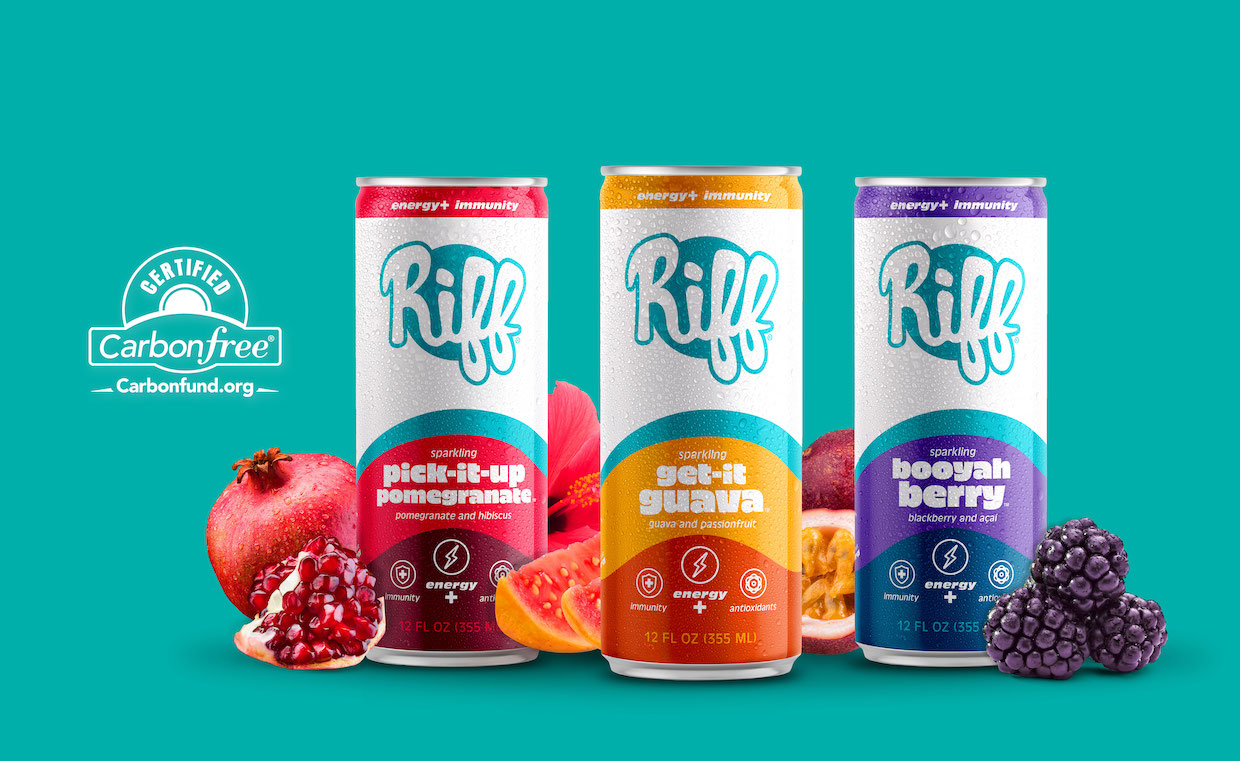
The Riff Energy+ drink line bearing the Carbonfree.org product certification seal. Riff press photo.
Last month, Bend, Oregon-based ready-to-drink cold brew and other plant-based beverage maker Riff launched what it advertised as being the nation’s first carbon-neutral energy drink.
The certification was achieved through Carbonfund.org, a New York State-based nonprofit that funds numerous third-party-certified renewable energy, energy efficiency and reforestation projects on behalf of businesses that purchase carbon offsets.
Additionally, Carbonfund.org maintains a Carbonfree Product Certification program, through which the Riff Energy+ line of beverages can now lay claim to certified carbon neutrality.
Made in Bend by Riff, which launched in 2017 before last year landing a $2.5 million seed funding round from numerous investors, the Riff Energy+ drink line offers numerous flavors of a sparkling beverage made with upcycled cascara, the dried outer fruit portion that is removed from coffee beans during processing and is typically either discarded or composted at the place of production.
Riff Co-Founder and CEO Paul Evers told DCN that the company currently has three different suppliers of cascara in various forms, including whole fruit and concentrates.
Related Reading
- The Third Wave Myth: Inside a Marxist Takedown of High-End Coffee’s Value Structure
- Olympia Coffee Earns Living Wage Certification for US Workers
- ‘Dutch Gum’ Maker Secures $2.3 Million for Coffee Pulp Product Development
In order to meet Carbonfund.org’s certification standards, Riff was required to carry out a life cycle assessment (LCA) of the product. Incidentally, Riff had previously been involved in two university-led reports in 2020 addressing the Energy+ drink: an LCA led by the researchers at the University of Oregon; and an environmental impact study on cascara at Oregon State University.
“Riff Energy+ is very, very close to being inherently carbon-neutral solely based on the diversion of cascara from becoming food waste,” Evers told DCN. “The certification did require the purchase of carbon offsets, but those only account for 0.1% of our revenue. With enhancements to our packaging in the near future, we’re seeing the ability to maintain the certification without the purchase of carbon offsets.”
Evers noted that it’s likely that the company’s other beverage products could meet Carbonfund.org’s carbon neutrality requirements, although for now the Energy+ line is the only one bearing the certification seal.
“It’s resonated with consumers and retail buyers in powerful ways,” Evers said. “And, being the first energy drink in the U.S. to achieve this brings us a lot of pride as a small brand based in the PNW. The certification is a leading banner for us.”
[Editor’s note: This story has been updated. The original version contained a typo that mistakenly identified Carbonfund.org as Carbonfree.org.]
Does your coffee business have news to share? Let DCN’s editors know here.
Nick Brown
Nick Brown is the editor of Daily Coffee News by Roast Magazine.
Comment
1 Comment
Comments are closed.






Hmmmm… another claim of carbon neutrality based, in part, on carbon offsets? One of these days someone will actually do a serious analysis of this scheme. I don’t have the brains or the bandwidth, but having worked on the inception of some of these schemes as a Wall Street lawyer two lifetimes ago, I doubt anything that was initiated and carried out in the large corporate sector was actually intended to change systems as opposed to preserve the existing system. I have interviewed farmers on their sale of carbon credits and compared what they receive versus what the companies who buy them can save by not upgrading their polluting machinery. What a joke, and of course the farmers are held hostage. Why wouldn’t people who are severely underpaid for their coffee want five thousand bucks to sell something they don’t actually have, especially when no one knows exactly how that transaction changes the carbon in the atmosphere?
And now an entire industry replete with consultants, ngo’s and carbon brokers has been created, largely on a fantasy. Time for a green coffee enema for the industry…oh, I guess we forgot about that scam, too!